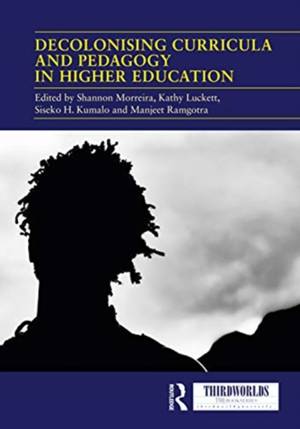
- Retrait gratuit dans votre magasin Club
- 7.000.000 titres dans notre catalogue
- Payer en toute sécurité
- Toujours un magasin près de chez vous
- Retrait gratuit dans votre magasin Club
- 7.000.0000 titres dans notre catalogue
- Payer en toute sécurité
- Toujours un magasin près de chez vous
Decolonising Curricula and Pedagogy in Higher Education
Bringing Decolonial Theory Into Contact with Teaching Practice
Description
This book brings together voices from the Global South and Global North to think through what it means, in practice, to decolonise contemporary higher education.
Occasionally, a theoretical concept arises in academic debate that cuts across individual disciplines. Such concepts - which may well have already been in use and debated for some time - become suddenly newly and increasingly important at a particular historical juncture. Right now, debates around decolonisation are on the rise globally, as we become increasingly aware that many of the old power imbalances brought into play by colonialism have not gone away in the present.
The authors in this volume bring theories of decoloniality into conversation with the structural, cultural, institutional, relational and personal logics of curriculum, pedagogy and teaching practice. What is enabled, in practice, when academics set out to decolonize their teaching spaces? What commonalities and differences are there where academics set out to do so in universities across disparate political and geographical spaces? This book explores what is at stake when decolonial work is taken from the level of theory into actual practice.
The chapters in this book were originally published as a special issue of Third World Thematics.
Spécifications
Parties prenantes
- Editeur:
Contenu
- Nombre de pages :
- 174
- Langue:
- Anglais
- Collection :
Caractéristiques
- EAN:
- 9780367747329
- Date de parution :
- 01-06-21
- Format:
- Livre relié
- Format numérique:
- Genaaid
- Dimensions :
- 175 mm x 246 mm
- Poids :
- 479 g

Les avis
Nous publions uniquement les avis qui respectent les conditions requises. Consultez nos conditions pour les avis.





